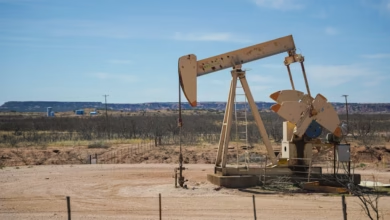Exploring Global Oil Reserves: Proven, Probable, and Potential Sources in Today’s Energy Landscape

**Introduction: Unraveling the Complex World of Oil Reserves**
In a world increasingly reliant on energy, understanding oil reserves is paramount. With crude oil remaining a cornerstone of the global economy, the distinctions between proven, probable, and potential oil reserves are critical in shaping oil market trends and influencing oil prices. As we delve into the intricacies of oil reserves, we will explore not only the volumes of oil locked beneath the earth's surface but also the geopolitical dynamics that govern their extraction and distribution.
The Organization of the Petroleum Exporting Countries (OPEC) plays a significant role in the global oil trade, influencing energy security and the complex web of oil supply chains. As countries grapple with the environmental impact of oil and the need for sustainable alternatives, innovations in offshore drilling and advancements in shale oil extraction are revolutionizing the industry. Furthermore, the rise of biofuels and other oil alternatives highlights the urgent need to balance oil consumption with environmental responsibilities.
Join us as we navigate this multifaceted landscape, examining how oil reserves shape not only the future of energy but also the geopolitical landscape, the intricacies of oil refining, and the evolution of oil technologies. Together, we will uncover the vital insights that investors and policymakers must consider in a world where the demand for energy continues to grow amidst shifting paradigms.
- 1. "Understanding Oil Reserves: A Deep Dive into Proven, Probable, and Potential Crude Oil Resources"
- 2. "The Geopolitical Landscape of Oil Reserves: How OPEC and Global Oil Trade Influence Prices and Energy Security"
1. "Understanding Oil Reserves: A Deep Dive into Proven, Probable, and Potential Crude Oil Resources"
Understanding oil reserves is crucial for navigating the complex landscape of the oil market, especially given the ongoing fluctuations in oil prices and the global demand for energy security. Oil reserves are typically categorized into three distinct classifications: proven, probable, and potential. Each category plays a vital role in oil exploration, production strategies, and determining the global oil trade dynamics.
**Proven Oil Reserves** refer to those quantities of crude oil that geological and engineering information indicates with reasonable certainty can be recovered under existing economic and operational conditions. These reserves are critical for oil exploration companies and investors alike, as they represent the most reliable source of future production. Proven reserves are often extracted through established methods, including offshore drilling and shale oil extraction, which employ advanced oil technologies to maximize recovery efficiency.
**Probable Oil Reserves**, on the other hand, encompass those quantities of crude oil that are less certain than proven reserves but still have a significant likelihood of being recovered. This category is influenced by various factors, including oil market trends and geopolitical considerations, particularly in regions heavily regulated by organizations like OPEC. As oil prices fluctuate, the economic viability of extracting probable reserves becomes a pivotal consideration for oil field services and upstream oil operations.
**Potential Oil Reserves** are the least certain of the three categories, representing estimates of quantities that might be recoverable in the future. This includes resources that are yet to be explored or developed, often found in challenging environments such as oil sands or deep-sea offshore drilling sites. The potential for these reserves is often tied to advancements in oil technologies and exploration methods, which can make previously unviable reserves economically feasible.
Understanding the distinctions between these categories of oil reserves is essential for stakeholders involved in oil investing, as they influence decisions related to oil storage, oil transportation, and the overall strategy for managing oil supply chains. Additionally, as the world increasingly considers the environmental impact of oil, the potential shift towards biofuels and oil alternatives may affect how reserves are evaluated and developed.
In summary, comprehending the nuances of proven, probable, and potential oil reserves is foundational for navigating the complex interplay of oil consumption, pricing, and geopolitics that shape our energy landscape. With ongoing developments in oil regulation and compliance, stakeholders must remain aware of the evolving context surrounding oil reserves and their implications for future energy strategies.
—
**Meta Description:** Explore the intricacies of oil reserves, including proven, probable, and potential resources, and understand their impact on oil market trends and energy security.
Oil reserves are a crucial component of the global energy landscape, influencing everything from oil prices to energy security. Understanding the different classifications of oil reserves—proven, probable, and potential—provides insight into the dynamics of the oil market and its future.
Proven oil reserves are those quantities of crude oil that geological and engineering information indicates with reasonable certainty can be recovered from known reservoirs under existing economic and operating conditions. These reserves are critical for oil companies and investors as they provide a reliable estimate of future oil production. Countries with significant proven reserves, such as those in OPEC, play a pivotal role in the global oil trade, impacting oil prices and market stability.
Probable oil reserves, while also recoverable, have a lower degree of certainty compared to proven reserves. These reserves are often based on exploratory drilling and geological assessments, making them important for oil exploration efforts. Companies engaged in shale oil extraction and offshore drilling often rely on these assessments to gauge the viability of new projects. The uncertainty surrounding probable reserves can affect oil price hedging strategies, as investors weigh the risks associated with fluctuating market conditions.
Potential oil reserves represent oil that is believed to exist but has yet to be discovered or delineated. These reserves are crucial for long-term energy planning and investment strategies. As technology advances, particularly in oil field services and oil technologies, the potential for discovering new reserves increases. However, the environmental impact of oil extraction and the ongoing shift towards oil alternatives, such as biofuels and renewable energy sources, raises questions about the sustainability of continued reliance on fossil fuels.
The geopolitical aspects of oil reserves cannot be overlooked. Oil geopolitics often dictate global relationships and influence oil supply chains. Nations rich in oil sands or natural gas reserves hold significant power in the international arena, and their decisions regarding oil consumption and production can have far-reaching implications for global oil market trends.
As the world transitions towards greener energy solutions, the future of oil reserves will be a topic of increasing importance. Oil refining practices and the development of petrochemicals will evolve alongside regulations aimed at minimizing the environmental impact of oil. The integration of oil transportation and storage strategies will also be crucial in ensuring energy security as countries navigate the complexities of oil demand and supply.
In summary, understanding the classifications and implications of oil reserves allows for better insights into oil market dynamics, investment opportunities, and the broader conversation around energy sustainability and environmental responsibility.
2. "The Geopolitical Landscape of Oil Reserves: How OPEC and Global Oil Trade Influence Prices and Energy Security"
The global oil landscape is intricately woven with the threads of geopolitics, primarily influenced by organizations like OPEC (the Organization of the Petroleum Exporting Countries) and the dynamics of the global oil trade. As countries navigate the complexities of oil reserves—categorized into proven, probable, and potential—these geopolitical elements significantly impact oil prices and energy security worldwide.
OPEC plays a pivotal role in regulating oil supply to stabilize or influence crude oil prices. By coordinating production levels among member nations, OPEC can adjust the oil supply in response to market trends, ensuring that prices remain within a profitable range for its members. This manipulation can lead to fluctuations in the oil market, significantly affecting oil investors and the broader economy. For instance, when OPEC decides to cut production, it often leads to an increase in oil prices, impacting everything from oil refining margins to the cost of transportation fuels.
Moreover, the emergence of shale oil in the United States has shifted the balance of power in oil geopolitics. With advances in oil technologies, including hydraulic fracturing and horizontal drilling, the U.S. has significantly increased its oil production capabilities. This surge not only enhances U.S. energy security but also poses challenges for OPEC, which must adapt its strategies to maintain market share amidst rising American crude oil output. The interplay between OPEC's traditional oil production methods and the innovative approaches of shale oil extraction exemplifies the ongoing evolution of the oil landscape.
In addition to production levels, oil transportation and storage are crucial components of the oil supply chain that contribute to price stability. The development of extensive oil pipelines and offshore drilling projects facilitates efficient distribution of oil, influencing both local and global oil prices. As countries seek to diversify their energy portfolios, including biofuels and oil alternatives, the demand for oil will inevitably continue to shape the geopolitical landscape.
Furthermore, the environmental impact of oil consumption and the regulatory frameworks surrounding oil exploration and production have become increasingly important in today's climate-conscious world. Governments are pressured to balance economic growth with environmental sustainability, pushing for greater compliance and innovation in the sector. This evolving regulatory environment affects everything from oil storage practices to the pursuit of natural gas and petrochemicals as potential alternatives.
In summary, the geopolitical landscape of oil reserves significantly influences oil prices and energy security. With OPEC's role in the oil market, the rise of shale oil, and the ongoing discussions around environmental impact and regulatory compliance, the dynamics of oil geopolitics will continue to shape the global oil trade. Understanding these factors is crucial for investors and policymakers as they navigate the complexities of oil consumption and its future.
**Conclusion: Navigating the Complex World of Oil Reserves**
In conclusion, understanding the intricate landscape of oil reserves—proven, probable, and potential—provides vital insights into the dynamics shaping the global oil market. As we delve into the realms of oil geopolitics, the influence of OPEC, and the ongoing trends in crude oil prices, it becomes evident that the interplay between supply and demand significantly impacts energy security and the future of oil consumption.
As countries explore shale oil and offshore drilling opportunities, the need for robust oil field services and advanced oil technologies becomes paramount. Furthermore, with the rise of oil alternatives and biofuels, the industry faces the challenge of balancing economic viability with environmental impact. The ongoing evolution in oil refining, oil transportation, and the complexities of oil storage and supply chains play crucial roles in shaping energy policies and oil price hedging strategies.
Ultimately, investors and stakeholders must remain vigilant in monitoring oil market trends, regulatory changes, and the broader implications of oil exploration and production. By understanding these factors, we can better navigate the shifting tides of the oil industry and contribute to a more sustainable and secure energy future.
As we continue to explore the vast potential of oil reserves alongside the pressing need for innovation in energy technologies, it is clear that the conversation around oil will remain a pivotal aspect of global economic and environmental discussions for years to come.





